
Washing Machine Not Spinning: Possible Causes And Fixes
When your washing machine is not spinning like it should, laundry day can come to a sudden halt. Whether your clothes are still dripping wet at the end of a cycle or the drum isn’t turning at all, there may be a few potential reasons why your washer is not spinning properly. This guide breaks down what to look for, what may be causing the issue and tips to help keep your washer spinning—so you can get back to getting the job done.

SIGNS A WASHER IS NOT SPINNING CORRECTLY
If your laundry is still soggy at the end of the cycle or something just feels off, your washer may be skipping the spin. Here are a few signs that could point to a spin cycle issue:
- Clothes come out soaking wet after the cycle ends
Heavier loads don’t come out clean
You don’t hear, feel or see the washer spinning
The washer repeatedly signals an unbalanced load
These signs may show up all at once or one at a time, but even one mishap is enough to slow down laundry day significantly. Keep reading to explore what may be behind the problem and how to help get your washer back on track.
8 REASONS A WASHER IS NOT SPINNING
A washer that won’t spin can leave your laundry soaking wet and your to-do list delayed. The good news: Some spin issues can be resolved without calling for service. Below are some potential reasons a washer may not spin properly, plus ways to help keep laundry day moving.
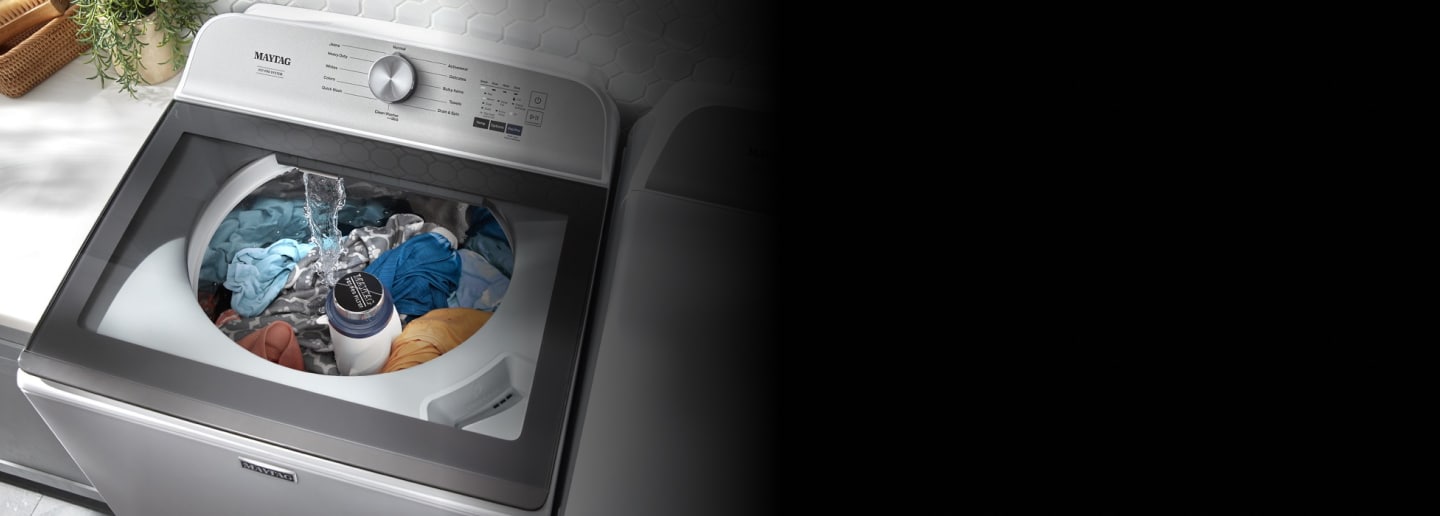
Maytag® washing machines
Designed for performance, control and convenience
Maytag® washing machines take stain fighting seriously with cycles built to push the limits of power
1. WASHING MACHINE IS TOO FULL
If the washer is packed too tightly, clothes won’t have room to move freely, which can prevent the spin cycle from completing. Overloading may also cause the washer to detect an imbalance, triggering a safety stop to protect the appliance.

TROUBLESHOOTING TIP
Try removing a few items and redistributing the load evenly in the drum. Washing smaller loads may help the washer maintain proper balance and may also improve spin performance.
2. LAUNDRY LOAD IS NOT BALANCED
An unbalanced or unevenly distributed load can prevent the washer from spinning. This can be more common when washing heavy items like towels or bedding that can clump together on one side of the drum.
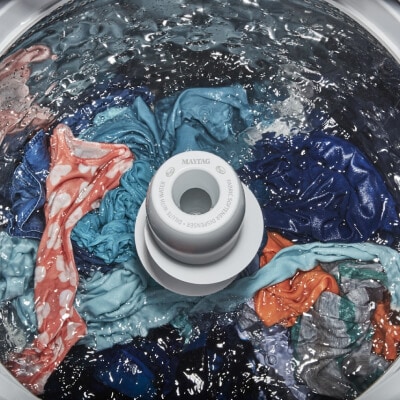
TROUBLESHOOTING TIP
Pause the cycle and rearrange the items to create a more even load. If the washer keeps signaling an unbalanced load, consider reducing the number of items per cycle.
3. WASHING MACHINE IS UNLEVEL
A washer that isn’t level may have trouble spinning correctly. It can cause the drum to wobble, resulting in excessive noise and a cycle that may not complete as expected.
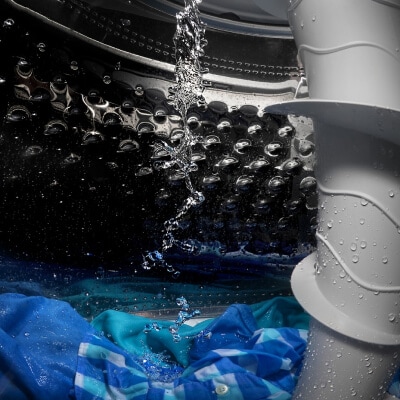
TROUBLESHOOTING TIP
Check to see if your washer is balanced from side to side and front to back. Adjust the leveling legs until the washer sits flat and stable on the floor. Be sure to reference your owner’s manual before you start the leveling process for specific instructions pertaining to your model.
4. DOOR OR LID NOT FULLY CLOSING
The washer won’t spin unless the lid or door has been securely closed. If the latch or switch isn’t engaged properly, the washer may pause or skip the spin cycle altogether.
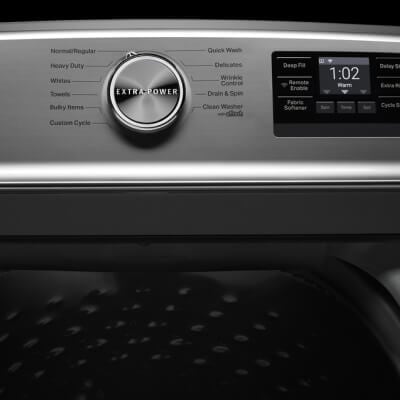
TROUBLESHOOTING TIP
Double-check that the door is shut firmly. If the washer still won’t spin, refer to your product manual to inspect the door latch.
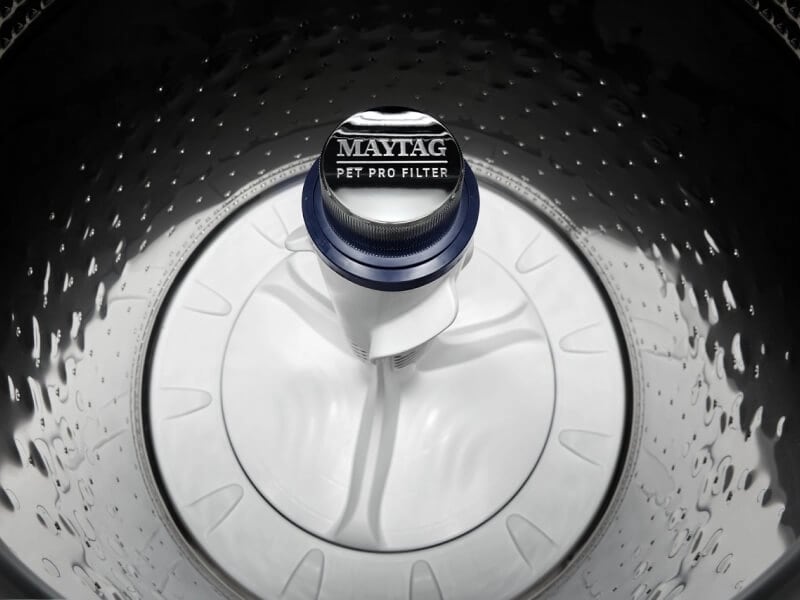
5. POWER FAILURE INTERRUPTS CYCLE
If a power outage occurs during the spin cycle, your washer may not have reached full spin speed. This can leave water in the drum and clothes wetter than expected.
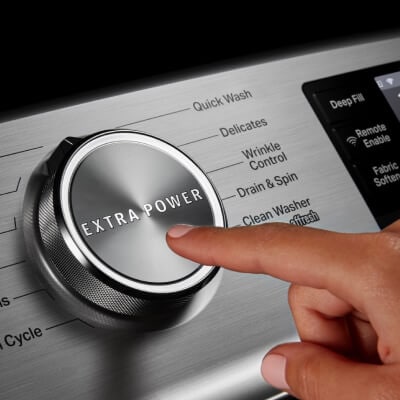
TROUBLESHOOTING TIP
Select a spin cycle or drain-and-spin cycle to help remove any remaining water and help finish the cycle.
6. SPIN SPEED IS TOO LOW
Delicate, hand wash and gentle cycles are designed with lower spin speeds to help protect fabrics. These cycles may leave clothes wetter than expected.

TROUBLESHOOTING TIP
For heavier or more absorbent loads, choose a cycle like heavy duty, which uses higher spin speeds. Always check the care labels on your laundry items before adjusting your cycle. Always follow your garment’s care tag instructions when selecting wash cycles.
7. TOO MANY SUDS IN THE DRUM
Using too much detergent or the wrong kind can create excess suds, which may prevent your washer from spinning or draining correctly.
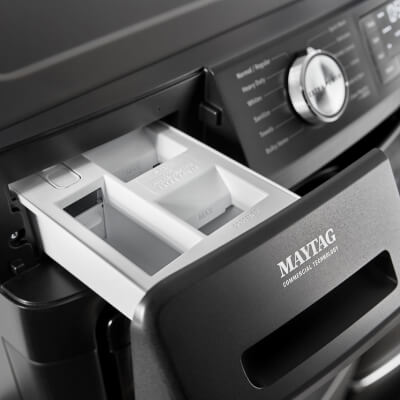
TROUBLESHOOTING TIP
Measure detergent carefully and follow the instructions on the packaging. Be sure to use only HE detergent in high-efficiency washers. Refer to your washer manual for additional detergent guidelines.
8. PAUSING THE WASH CYCLE
Adding items too late in the cycle can prevent the washer from reaching top spin speeds. This can leave clothes wetter at the end of the cycle, especially if the spin ramp-up is interrupted.
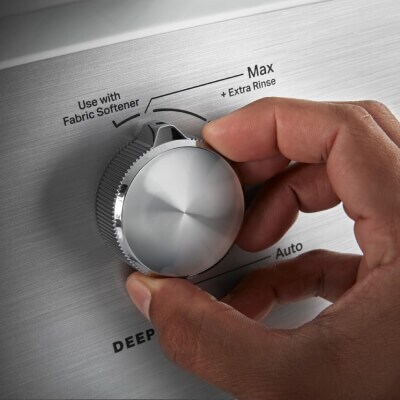
TROUBLESHOOTING TIP
Some washers have an “add garment” light. Keep an eye on this, if available, to know the best time to add forgotten items. On select Maytag® washers, the Late Add Feature allows you to simply press the start button to pause the washer and add in last-minute items.
SHOP MAYTAG® WASHING MACHINES WITH EXTRA POWER
Maytag® washing machines deliver powerful cleaning you can depend on, backed by the added boost of Extra Power. The Extra Power Button boosts stain fighting on any wash cycle with an intense pre-wash and extra agitation so you can walk away while stains wash away. Explore Maytag® washing machines in front and top load configurations with the features you need to give your laundry a serious clean.

WHY IS MY WASHING MACHINE NOT SPINNING FAST?
Your washer may not spin fast due to an incorrect cycle, spin speed setting, unbalanced load, excessive suds or a drain hose that’s been incorrectly installed.
Cycle selection matters. Certain cycles are designed to spin more slowly to help protect fabrics and prevent wrinkling. Cycles like delicate or hand wash use slower spins to help protect fabrics. These settings leave more water in the load by design. Always select the right cycle for the type of fabric you are washing.
Spin speed settings. Using extra low, low or no spin may leave clothes wetter than expected. Choose the highest spin speed suitable for your load to help remove more water.
Bulky or single items. A single absorbent item like a rug or blanket can cause the washer to detect an unbalanced load and lower spin speed. Add another damp item and run a drain-and-spin cycle to help balance the load.
Excess detergent. Too much detergent—or using non-HE detergent when required—can create excess suds, leading to reduced spin speeds. Always use HE detergent when required and measure according to package instructions, especially in areas with soft water (where you may need less detergent).
- Drain hose issues. If the drain hose has been installed incorrectly, spin performance may suffer. Use the U-shaped drain hose form, insert only 4.5 inches into the drainpipe, and make sure the standpipe is between 39 inches and 96 inches high. Check for kinks or clogs as well.
TIPS TO HELP KEEP YOUR WASHER SPINNING AS EXPECTED
A washer that spins well can help clothes come out cleaner and drier. Use these tips to help support your washer’s spin performance and reduce interruptions.
Avoid overloading the drum; wash medium-sized, balanced loads.
Select a cycle and spin speed suited to the fabric you are washing.
Add a second damp item when washing a single bulky piece.
Measure detergent carefully and use only HE detergent, if required.
Check that the washer is level before starting a load.
Inspect the drain hose for kinks, clogs or incorrect installation.
Restart the cycle or reset the washer after a power outage.
EXPLORE MAYTAG® WASHING MACHINES
Explore Maytag® washing machines with the features you need to conquer laundry day one pile at a time. Select models from Maytag brand feature Deep Water Wash Options combined with a ½ Horsepower Motor and a Dual Action Agitator to help move clothes through the water to create Outstanding Roll-Over Action, delivering a robust clean in short cycle times. Other models include a Built-in Water Faucet which allows you to rinse, spot treat or soak clothes right in the washer. Choose a model that works as hard as you do—built for powerful performance and designed to help you take on tough loads with confidence.

